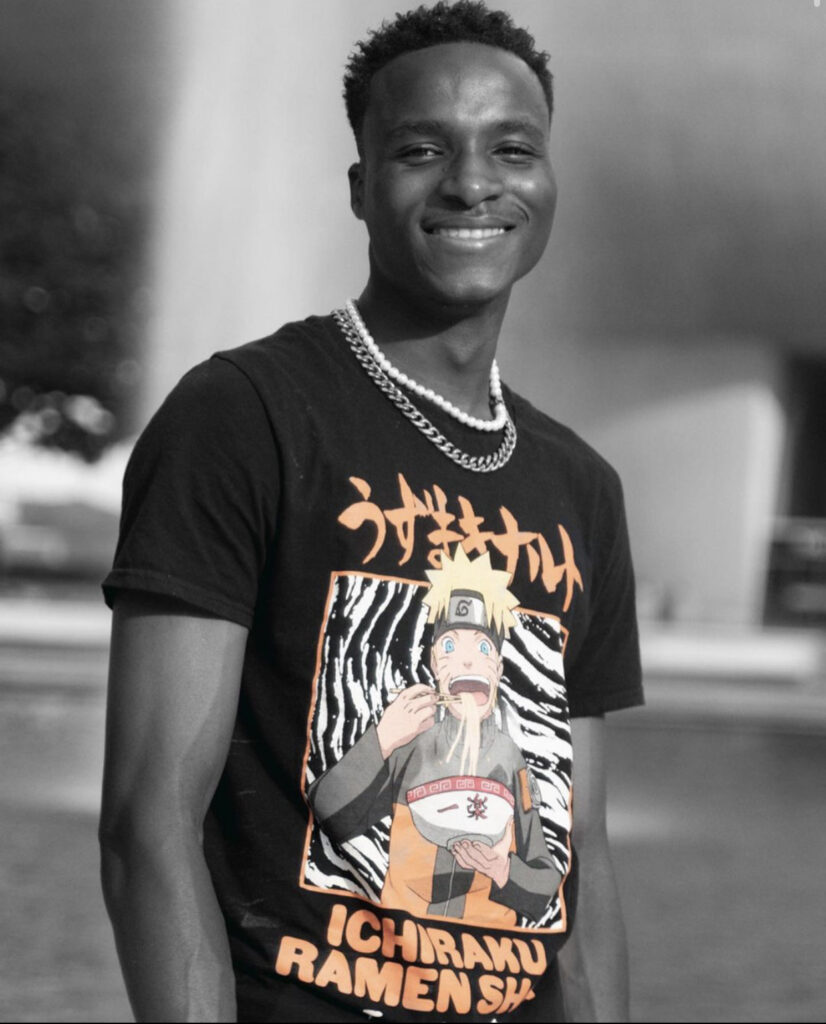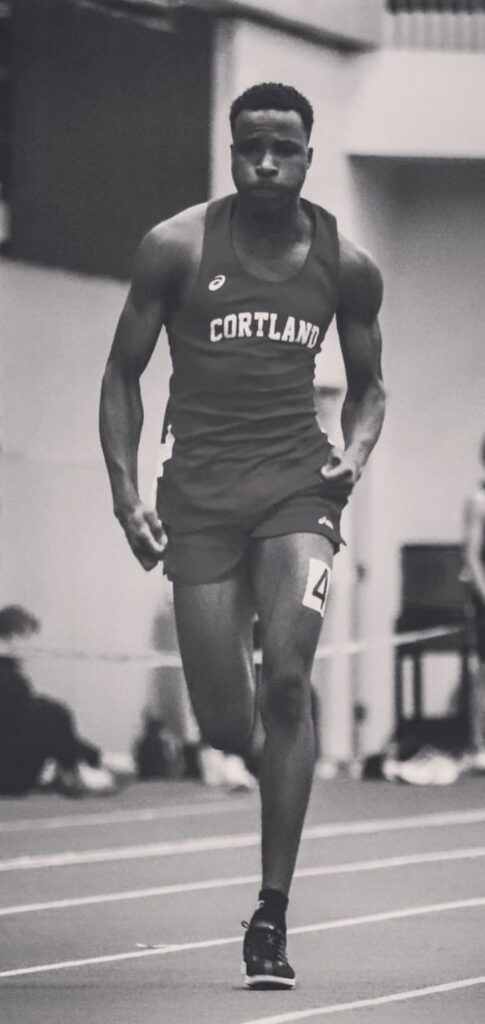When you hear the word transition, of course the next word that comes to your head is probably “change.” Everybody has to transition at some point within their lives. Being able to master the art of transition? That’s only a skill that only very few have mastered.
Despite his youth, it seems that sophomore Muiz Bayewu already has a strong grip on being able to adapt to change
The ability to transition would start at a very young age for Bayewu, who grew up in his homeland of Nigeria.
When speaking on life back in Nigeria, Bayewu had nothing but praise for the place where his story would begin.
“Life in Nigeria was pretty fun, for the most part. I had plenty of good times growing up over there.”
There is always some bad that comes with good, however, as the first transition Bayewu would have to experience came at six years old when his parents separated from each other. A change that would affect any child that grew up with both parents. This would ultimately lead to Bayewu’s mother coming over to America, where she currently resides.
“It was tough when my mom left. The major change from that experience was obviously not having both parents in the household for a long time. It definitely affected me with not being able to see her everyday. ”
As tough as it was to not have his mother around during his early stages of life, Bayewu had plenty of people that he was around on a daily basis, as he grew up in an extended family household.
“I had all of my cousins with me, and I am the youngest of 10 siblings. Being the youngest was cool, since I was always spoiled and my siblings couldn’t really do anything to me. It was always cool having a bunch of family near me, including my father.”
Bayewu’s father, Moruf Bayewu, is a politician and businessman back in Nigeria. Muiz attributes a lot of his hard work to his father, as his dad would have to work for hours on end.
“My dad was usually never home. He works extremely hard. I feel like a lot of that work ethic got to me, and I feel like I can get through anything thrown at me.”

The next transition Bayewu would have to face would put that statement to the test: His father would send him to a boarding school about 6 hours away from home. It’s hard enough for college students to leave their parents when they drop them off at school for the first time, and for a ten year old Bayewu, it taught him an extreme amount of discipline.
“It was like going to Military School in America. No phones or electronic devices. Nothing. And over there in Nigeria, you would get disciplined for not listening. So it taught me at a very early age to respect all of my elders.”
His experience wasn’t all that bad however, as Bayewu stated that he “made a lot of friendships to last him a lifetime” during his time at boarding school.
Fast forward 3 years later after repeating the same cycle of breakfast, class, lunch, and two study hall sessions in between dinner before having to go to bed at 8 p.m Bayewu would have a talk with his father due to his disliking of the boarding school he currently attended. Being as far away from home as he was never sat well with him, and his father came to an agreement with him to move him to a boarding school closer to home.
Unfortunately, the boarding school that Bayewu was supposed to transfer to was at full capacity before he was able to go. This would lead to a conversation between Bayewu and his mother, which would ultimately lead him to the hardest transition he might’ve had to experience: Leaving his home country to live with his mother in America.
“I always wanted to come to America. When I talked with my mom about it, I told her I was ready to go whenever she was ready to have me.”
Despite the eagerness and excitement to come to America, transitioning to another country is never easy. For Bayewu, at the dawn of his teenage years, one of his biggest obstacles were going to come from his American classmates.
Why is that? Because American teenagers have tendencies to be extremely judgemental.
“There were so many assumptions about Africa when I came over. It’s like they think we have no civilization over there. Some parts aren’t great, but it’s not like that everywhere. Trying to explain that to my classmates was extremely hard, but those stereotypes would go away with time.”
Bayewu would also struggle with trying to get his American peers to understand the way he spoke english. Bayewu came over in the spring of his 8th grade year. He explained that english was taught over in Nigeria up until high school, but due to the constant changing of slang in America, it was difficult for him at times to understand what people were saying to him, and vice-versa.
“I always tried to pick up on what everyone was saying, but it was difficult at times. But I was able to adapt quicker than I thought.”
Bayewu would breeze through his last month of middle school then would attend Albany High School. His freshman year would be the first time he would play organized sports. He never played organized soccer while he was in Nigeria.
When he came over to America, it was awkward at first for him to take criticism from a coach, and he also wasn’t in the best shape that he wanted to be. This would lead him to run track in high school as well, joining the team his sophomore year.
Bayewu would get up to the varsity level his junior year for both soccer and track, and would really come alive his senior year. He would win team MVP for soccer, despite COVID-19 impacting his summer in regards to training.
Bayewu didn’t garner much interest from soccer despite his strong play. He would commit to Cortland as a Physical Education major, with an interest in trying out for the Men’s Soccer program.
Once at Cortland, Bayewu knew he would have to adapt to collegiate soccer. He was extremely motivated by the amount of talent that he was surrounded with his first year, and wanted to put the work in even more to be able to be successful.
“It’s different when you get to college and every single person on the team is as talented as you. I knew I couldn’t take my foot off the gas pedal, and I knew I had to make sure I got better by any means.”
It’s hard enough to be a college athlete at a top school throughout the division. But it’s even harder to go out and be a dual sport athlete in two sports that are nationally ranked amongst all of division III schools.
This past winter, Bayewu would successfully tryout for the men’s track and field team. The latest transition that he has to encounter in his life. Similar conditioning wise, Bayewu is doing his absolute best to getting used to what has been so far a pretty solid change.

“The transition isn’t too bad. I love the team. A huge part of the reason I love Cortland has been my teammates in both sports. Coming over to track, it definitely hasn’t been easy, but it’s easier to work with because of the people I’m surrounded with everyday.”
His work ethic has caught the attention of a lot of his peers on the track team, including Evan Jensen, a sophomore sprinter on the track team.
“He works extremely hard in practice even with not running track in years,” said Jensen. “He shows the mentality that you’re going to need as an athlete every single day, and many should look up to that.”
Despite him still learning a lot of new aspects in track, Jensen thinks that “nothing will stop Muiz from getting better everyday,” as him and the rest of the team are extremely excited to see him progress.
Steve Patrick, the head coach for the track and field team, knows better than most the sacrifice that it takes to be a varsity athlete on the track team, let alone two sports.
“The hardest part is that you’re never really in an ‘off season’,” said Patrick. “What’s impressive to me is that Muiz sought out the opportunity to get involved in another sport with all of the time, energy and emotional investment that comes with that.”
Patrick also gave praise to Bayewu’s dedication, his eagerness to learn and to go out and compete in track meets, and stated that he has been “a great supporter of his new teammates at practice.”
Bayewu has the recipe for success. Nothing is too great for him to accomplish. Life is full of transitions, and the older you become, the more you will need to navigate through. While the future is uncertain, there is one thing that will always be for certain; Muiz Bayewu will be ready, as he continues to learn, work, and stay patient for the next transition to come his way.